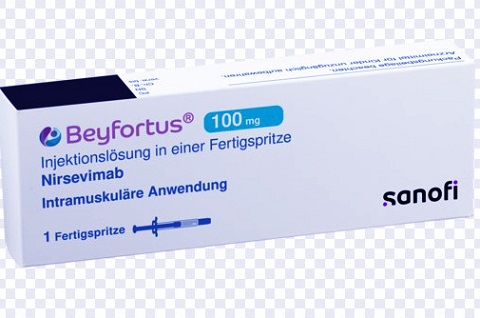Nikhil Prasad Fact checked by:Thailand Medical News Team Nov 29, 2024 4 months, 2 weeks, 1 day, 13 hours, 6 minutes ago
Medical News: Respiratory Syncytial Virus (RSV) is a major cause of hospitalizations in infants worldwide, with an estimated 33 million cases of RSV-related acute respiratory infections in children under five annually. This common virus can lead to bronchiolitis and increase the risk of asthma in affected children. A notable 3% of cases require hospitalization, and in severe instances, intensive care.
 French Researcher Warns Against Beyfortus (Nirsevimab) Use for RSV in Children
French Researcher Warns Against Beyfortus (Nirsevimab) Use for RSV in Children
To address this, pharmaceutical interventions like monoclonal antibodies have been developed. Beyfortus (Nirsevimab)by Sanofi, a therapeutic monoclonal antibody, is positioned as a more advanced solution than its predecessor, Palivizumab. While it requires only a single dose and boasts a longer lifespan due to enhanced binding properties, concerns have arisen about its safety and effectiveness.
What This Article Highlights
Dr. Hélène Banoun, an independent researcher based in Marseille, France, has raised concerns about Beyfortus in her recent analysis. Her critique extends to the potential risks, biases in studies, and the economic justification for mass immunization campaigns. This
Medical News report delves into her findings, which question the safety profile and effectiveness of Beyfortus, emphasizing potential adverse effects like Antibody-Dependent Enhancement (ADE).
Key Findings from Clinical Trials
Nirsevimab’s effectiveness is supported by reduced RSV hospitalizations in clinical trials. However, Dr. Banoun’s analysis highlights concerning trends:
-Potential for ADE: ADE occurs when antibodies, instead of neutralizing a virus, facilitate its entry into cells, worsening the infection. This phenomenon was noted in earlier trials with RSV vaccines targeting the F protein, a key element of Nirsevimab’s mechanism. Dr. Banoun suggests that preclinical and clinical evaluations inadequately assessed ADE risks.
-Exclusions in Studies: Many participants were excluded from efficacy analyses. For instance, in the MELODY trial, 8.1% of treated children were removed from the study. Exclusions like these, coupled with incomplete testing for RSV in hospitalized children, undermine confidence in the reported outcomes.
-Adverse Events: Reports indicate a higher incidence of respiratory infections, febrile convulsions, and severe conditions in the treated group compared to the placebo group. This raises questions about the safety of Nirsevimab, especially when administered to newborns.
-Pharmacovigilance Data: Post-marketing surveillance in Europe has linked Nirsevimab to unexpected rates of bronchiolitis and other severe respiratory conditions. In France, a notable increase in neonatal deaths during the immunization campaign warrants further investigation.
Economic and Ethical Considerations
Dr. Ba
noun critiques the economic viability of Nirsevimab for universal immunization campaigns. Given its high cost, the marginal reduction in RSV-related hospitalizations may not justify the expense. Furthermore, she questions the ethical implications of fast-tracking approvals for such a widespread application, particularly when gaps in safety data persist.
Implications of ADE and Immune Disruption
The enhanced binding properties of Nirsevimab could paradoxically facilitate viral entry into cells under certain conditions. Dr. Banoun warns that this may aggravate RSV infections in some children, potentially leading to severe outcomes like bronchiolitis or pneumonia. The interplay between Fc receptors and immune responses, crucial in ADE mechanisms, remains inadequately explored for Nirsevimab.
Conclusion
Dr. Banoun’s review underscores the need for more comprehensive evaluations of Nirsevimab’s safety and effectiveness. While it shows promise in reducing RSV hospitalizations, potential risks like ADE and immune system disruption cannot be overlooked. Policymakers and healthcare professionals must weigh these findings carefully when considering mass immunization programs.
The study findings were published on a preprint server and are currently being peer reviewed.
https://www.preprints.org/manuscript/202406.0714/v3
For the latest RSV News, keep on logging to Thailand
Medical News.
Read Also:
https://www.thailandmedical.news/news/unveiling-the-role-of-cx3cr1-in-rsv-infections
https://www.thailandmedical.news/news/how-rsv-dodges-our-body-s-defense
https://www.thailandmedical.news/news/probenecid-found-to-inhibit-respiratory-syncytial-virus-replication
https://www.thailandmedical.news/news/respiratory-syncytial-virus-infections-in-infants-causes-a-variety-of-long-term-health-issues-later-in-life
https://www.thailandmedical.news/news/early-childhood-rsv-infection-leads-to-lifelong-immune-changes-in-the-gut-and-lungs
https://www.thailandmedical.news/news/italian-researchers-warn-that-common-respiratory-rsv-infections-are-a-threat-to-the-brain
https://www.thailandmedical.news/news/jak-stat-pathway-identified-as-a-therapeutic-target-in-respiratory-syncytial-virus-rsv-infections
https://www.thailandmedical.news/news/medical-news-respiratory-syncytial-virus-rsv-infects-nerve-cells-directly-and-can-cause-a-variety-of-long-term-neurological-issues
https://www.thailandmedical.news/news/rsv-news-what-they-are-not-telling-you-about-current-respiratory-surges-new-rsv-genotypes-at-play-and-sars-cov-2-induced-immune-dysfunction
https://www.thailandmedical.news/news/medical-news-study-shows-that-azelastine-hci-is-an-effective-broad-spectrum-antiviral-against-various-respiratory-viruses-including-sars-cov-2-and-rsv
https://www.thailandmedical.news/news/breaking-american-and-argentinian-scientists-find-that-the-human-respiratory-syncytial-virus-rsv-is-rapidly-mutating-to-evade-vaccines
https://www.thailandmedical.news/news/breaking-scientists-discover-new-circulating-rsv-virus-variants-that-is-causing-prolong-infection-especially-among-infants-and-young-children
https://www.thailandmedical.news/news/warning-adults-can-also-contract-rsv-infections-and-its-usually-severe-in-the-aged-is-the-current-rvs-wave-due-to-newly-emerged-strains
